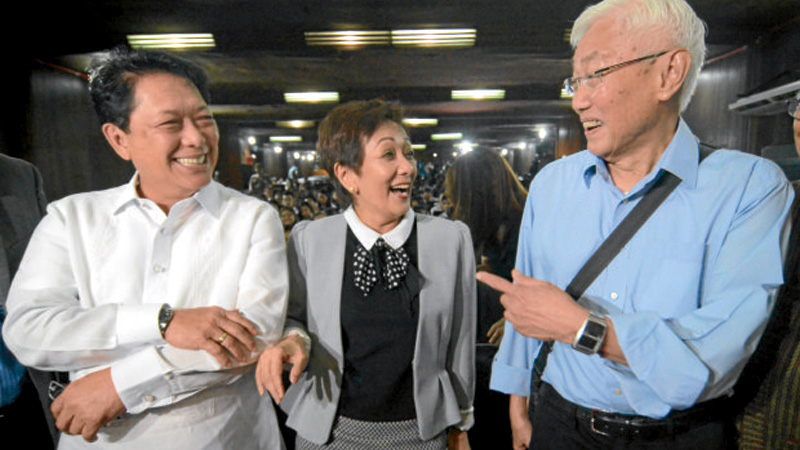Jalandoni urges youth to join talks

PEACE FORUM Chief peace negotiators—Labor Secretary Silvestre Bello III (left) for the government and Luis Jalandoni for the communist-led National Democratic Front of the Philippines—speak during a forum on the peace process at Pamantasan ng Lungsod ng Maynila (PLM). With them is PLM president
Leonora de Jesus. ARNOLD ALMACEN
FOR THE NATIONAL Democratic Front of the Philippines (NDFP) chief negotiator, Luis Jalandoni, the success of the peace talks in ending the 47-year communist insurgency lies not in just the negotiators, but the Filipino youth as well.
Speaking before students and faculty of Pamantasan ng Lungsod ng Maynila (PLM), Jalandoni said the conflict would not be so easy to resolve without genuine land reform and national industrialization.
“The key factor in the peace talks depends not only on the negotiating panel, but on the Filipino people … . It requires the active participation of all, especially the youth,” he said.
Jalandoni shared the stage with his government counterpart, Labor Secretary Silvestre Bello III, during PLM’s first Public Policy Forum.
Bello expressed optimism that the peace talks between the NDFP and the government would be “concluded and signed within nine to 12 months” and that a development may be expected by August next year.
Article continues after this advertisementPrisoners’ freedom
The government chief negotiator noted that President Duterte’s commitment to free jailed NDFP consultants and the announcement of general amnesty paved the way for the smooth flow of negotiations.
Article continues after this advertisement“The peace talks will not bring lasting and just peace if the root causes of the conflict, which is extreme poverty, public belief that the government is capable of bringing justice, and massive corruption among government ranks, are not addressed decisively,” Bello said.
Like Jalandoni, Bello urged Filipino youths to support the peace process so that the peace talks will push through and that the “next generation may reap the dividends of peace.”
Mr. Duterte declared a unilateral and indefinite ceasefire on the eve of the formal resumption of the peace talks with the NDFP on Aug. 21.
The NDFP then extended its own ceasefire to an indefinite and unilateral ceasefire upon the conclusion of the first round of talks on Aug. 26 in Oslo, Norway.
Prior to this, 22 NDFP consultants were released so that they may take part in the peace talks.
Timetable
For his part, Jalandoni said both sides were working hard to achieve the target to conclude the peace talks in nine to 12 months.
“But I have to be frank also, a 47-year-old conflict will not be so easy to resolve,” he said.
There will be no real and lasting peace if peasants do not have genuine land reform, without national industrialization, and if students, women groups, indigenous peoples and the urban poor are not able to get justice and their rights respected, he said.
“Land reform and national industrialization will be key factors in addressing roots of the armed conflict. With Mr. Duterte’s commitment and with the support of the people especially the youth, this can be taken up,” he said.
Students are welcome to send their suggestions to end the conflict. “The youth in this university will be necessary to build and create a strong powerful and independent Philippines,” he said.
The second round of talks is scheduled on Oct. 6-10 in Oslo, Norway.
Jalandoni expressed optimism that political prisoners would be granted amnesty as promised by Mr. Duterte.
The President sees the grant of general amnesty as an important point in pushing for peace talks and unity in the country as well as respecting the rights of the political prisoners,” he said.
He said that Congress would likely approve amnesty for political prisoners, noting that majority of the lawmakers were the President’s allies.